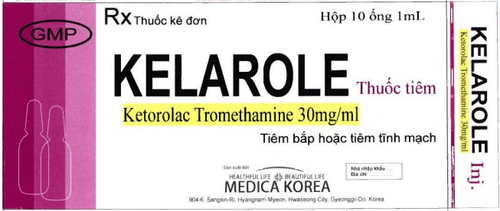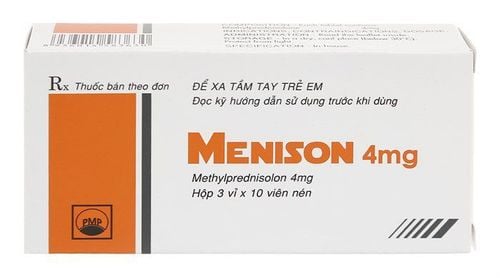Voltaren 75mg contains the active ingredient - diclofenac sodium, which is indicated for the treatment of inflammation and pain following surgery or trauma, osteoarticular pain, adnexitis, dysmenorrhea, and other conditions. Read the article below to learn more about the dosage of Voltaren 75mg and how to use it safely.
1. Uses of Voltaren 75mg
1.1 What is Voltaren 75mg usually used for?
Voltaren 75mg is indicated in the following cases:
Presence of different types of joint conditions including inflammation, pain, and degeneration: ankylosing spondylitis, rheumatoid arthritis, back pain syndromes, arthritis, spine inflammation, osteoarthritis, as well as conditions affecting tissues surrounding the joints. It also includes inflammation, pain, and swelling after surgeries or injuries, like orthopedic or dental surgery, and pain in gynecological conditions like pelvic inflammation or menstrual cramps.
1.2 Pharmacodynamics
Diclofenac in Voltaren has been demonstrated to significantly reduce the signs of pain, including rest pain, morning stiffness, movement-induced pain, and joint swelling, hence improving joint function. For injury related or postoperative inflammation, Voltaren reduces pains including spontaneous and movement-induced pain, minimizes wound swelling, and inflammation. Voltaren 75mg is available in various formumlations, such as topical application, standard tablets, and extended-release tablets. The extended-release formulation is particularly suitable and convenient for patients requiring a daily 75mg dose. The once-daily regimen simplifies long-term treatment and minimizes dosing errors. The 75mg formulation also allows for a maximum dosage of 150mg per day, divided into two doses.
1.3 Pharmacokinetics
- Absorption: Voltaren 75 mg is formulated as an extended-release tablet, resulting in a lower peak plasma concentration compared to the total concentration packed inside an enteric-coated tablet in the recommended dosage. The pharmacokinetics of the drug remain stable, with consistent steady-state concentration and nil drug accumulation in plasma between repeated doses. Food has no effect on the absorption and systemic effects of Voltaren extended-release tablets.
- Distribution: About 99.7% of the administered dose is bound to plasma proteins, mainly albumin (99.4%). The distribution volume is approximately 0.12–0.17 L/kg. Diclofenac penetrates synovial fluid, reaching peak concentrations 2–4 hour after reaching peak plasma levels.
- Metabolism: Metabolism occurs partially through glucuronidation of the active molecule and predominantly through single or multiple hydroxylations and methoxylation to produce phenolic metabolites. Most of these metabolites are converted to glucuronides. Of which, two phenolic metabolites are biologically active, though their activity is weaker than that of diclofenac.
- Elimination: About 60% of the administered dose is excreted through the urine as intact glucuronide conjugates and metabolites. Less than 1% of the drug is excreted unchanged, with the remainder excreted via bile in the feces
2. Dosage
Dosage of Voltaren 75mg depends on patient condition and the level of absorption. The dose must be determined by a doctor, as dosage may be modified from ther recommended parameters depending on the patient’s unique pharmacokinetics. Patients should never take Voltaren 75mg without a prescription from their doctor. The recommended dosage for Voltaren 75mg is as follows:
General population:
- The recommended initial dose is 100–150 mg/day.
- If mild symptoms or long-term treatment, the recommended dose is 75–100 mg/day.
- For patients with more severe symptoms at night or in the morning, they should take extended-release Voltaren 75 mg or 100 mg tablets in the evening.
Special Patients Groups:
- Children:Do not administer Voltaren 75 mg and 100 mg extended-release tablets for children and adolescents.
- Elderly Patients: No adjustment to the initial dose is required for elderly patients.
- Patients with Cardiovascular Disease or Significant Cardiovascular Risk Factors: Voltaren is not recommened for these patients. If necessary, the dose should be below 100 mg/day.
- Renal Impairment Patient: Contraindicated in patients with severe renal impairment. Voltaren should be used with caution in patients with mild to moderate renal impairment.
- Hepatic Impairment Patient: Contraindicated in patients with severe hepatic impairment. Voltaren should be used with caution in patients with mild to moderate hepatic impairment.
3. Voltaren 75mg – side effects
Voltaren 75mg may have some side effects:
- Nervous system disorders like dizziness and headaches;
- Ear disorder and balance problems like vertigo;
- Gastrointestinal problems such as diarrhea, nausea, indigestion, vomiting, bloating, stomach pain, or loss of appetite;
- Hepatobiliary issues such as increased liver enzyme levels;
- Skin problems like rash;
- Heart issues such as heart failure, heart attack, chest pain, or palpitations.
If you have any side effects, stop taking the medication immediately and contact your doctor or visit the nearest medical center for care timely.
4. Considerations for Use
4.1 Contraindications
Voltaren 75mg is contraindicated in these cases:
- Patients allergic to any component of Voltaren;
- Patients with active inflammation, gastric or duodenal ulcers, gastrointestinal bleeding, or perforation;
- Pregnant women during the third trimester of pregnancy;
- Patients with severe liver impairment;
- Patients with severe renal impairment or heart failure;
- Similar to other non-steroidal anti-inflammatory drugs (NSAIDs), Voltaren 75mg is contraindicated in patients with asthma, urticaria, or acute rhinitis triggered by NSAIDs or acetylsalicylic acid.
4.2 Cautions when using
- Gastrointestinal Effects: Voltaren and other NSAIDs have been reported to increase the risk of gastrointestinal ulcers, bleeding, or perforation. Elderly patients have a higher risk of these adverse effects . In cases of gastrointestinal bleeding or ulcers, Voltaren regimen should be halted immediately. The initial and maintenance doses should be kept at the lowest effective level. In some cases, combination therapy and use of protective agents should be considered for patient's safety (such as misoprostol or proton pump inhibitors).
- Cardiovascular Effects: Long-term treatment (especially high doses) with Voltaren or other NSAIDs is associated with an increased risk of serious cardiovascular thrombotic events (including sudden stroke and myocardial infarction). Generally, Voltaren is not recommended for patients with cardiovascular diseases.
- Hematological Effects: Patients should be montitored their blood count if they used long-term NSAID treatment
- Respiratory Effects: Reactions to NSAIDs such as urticaria, Quincke's edema, and exacerbations of asthma are common in patients with a history of asthma attacks. As such, these patient groups require special precaution when taking Voltaren.
- Hepatobiliary Effects: Patients with impaired liver function should be closely monitored when using Voltaren due to the increased risk of liver failure.
- Renal Effects: Treatment with diclofenac and other NSAIDs may cause edema and fluid retention so special precaution is advised for patients with heart or renal failure, people with a history of hypertension, or those taking diuretics or other drugs affecting the renal function.
- Dermatological Effects: Serious skin reactions like exfoliative dermatitis, toxic epidermal necrolysis, and Stevens-Johnson syndrome, have been reported in rare cases of using NSAID.
- Elderly Patients: Caution is advised when using Voltaren in elderly patients. It is recommended to use the lowest dose which is effective in frail or underweight elderly individuals.
- The drug may mask signs of infection.
- Pregnancy: There is insufficient data on the safety of diclofenac in pregnant women. As such, its use is not recommended during the first and second trimesters of pregnancy unless the benefits outweigh the risks. The drug is contraindicated during the third trimester.
- Breastfeeding: Diclofenac can be passed into breast milk, thus not recommended for breastfeeding patients to avoid adverse effects.
5. Interaction
Voltaren 75mg may have some interaction when combine with the following drugs:
- Non-steroidal anti-inflammatory drugs (NSAIDs): Using diclofenac with other NSAIDs can increase the risk of gastrointestinal bleeding.
- Diuretics and antihypertensive drugs: use with diclofenac may reduce the antihypertensive effect of these medications.
- Cardiac glycosides: May worsen heart failure, impair renal function, and increase plasma glycoside levels.
- Antiplatelet drugs and anticoagulants: Use caution when combining with diclofenac as it may increase the risk of bleeding.
- Quinolone antibiotics: May increase risk of seizures.
- Lithium: Voltaren increases lithium plasma concentrations, so lithium levels should be monitored.
- Methotrexate: Voltaren inhibits renal clearance of methotrexate, increasing its plasma levels and toxicity risk.
- Cyclosporine: Increases nephrotoxicity of cyclosporine.
- Digoxin: Diclofenac increases plasma levels of digoxin.
- Phenytoin: Plasma phenytoin levels should be monitored when co-administered with diclofenac.
Please dial HOTLINE for more information or register for an appointment HERE. Download MyVinmec app to make appointments faster and to manage your bookings easily.













